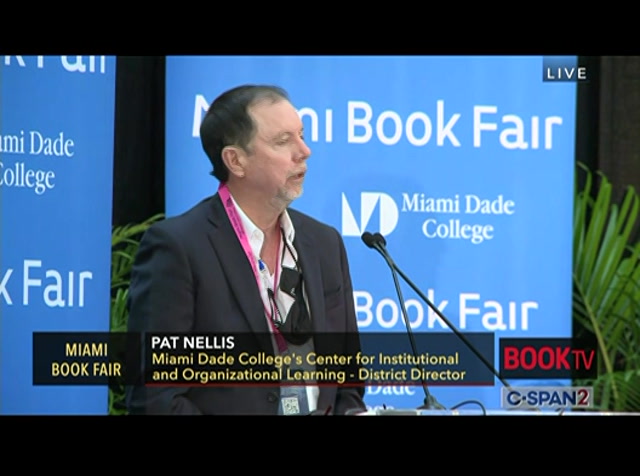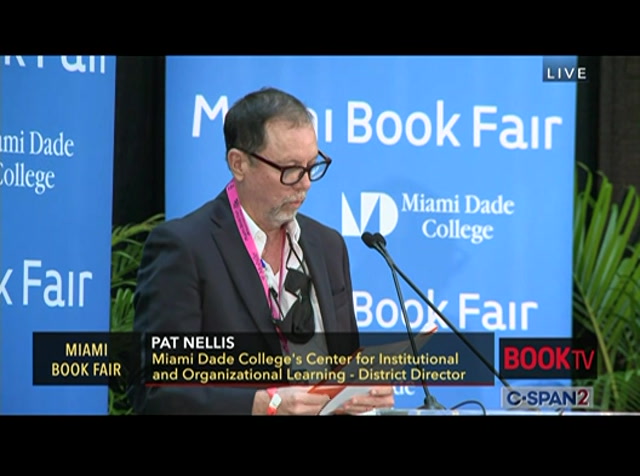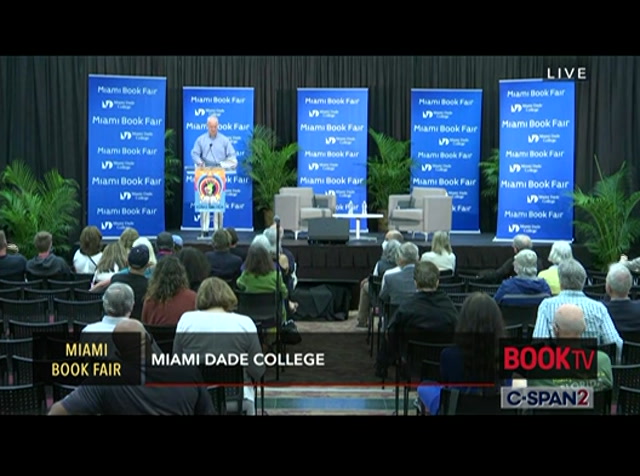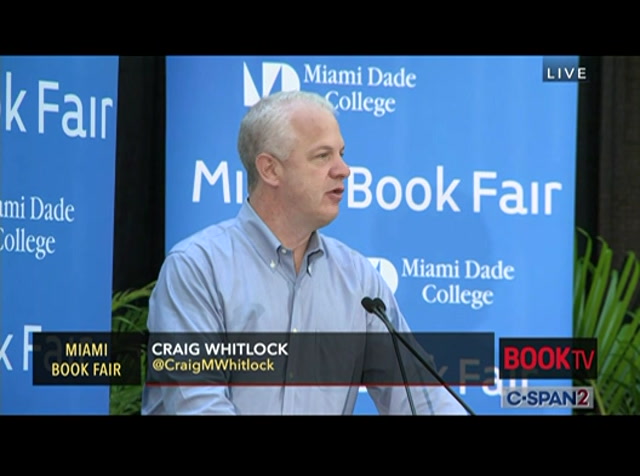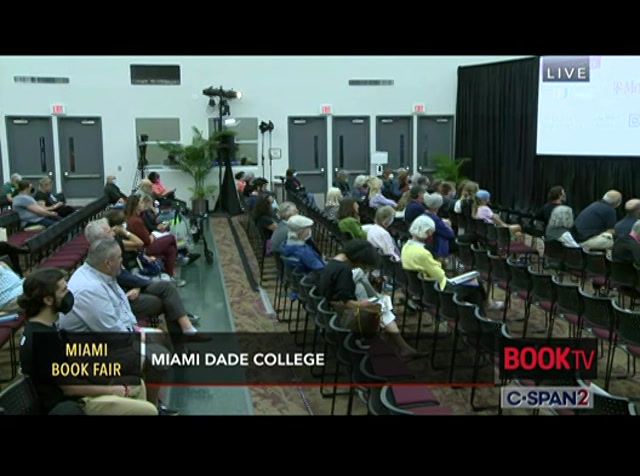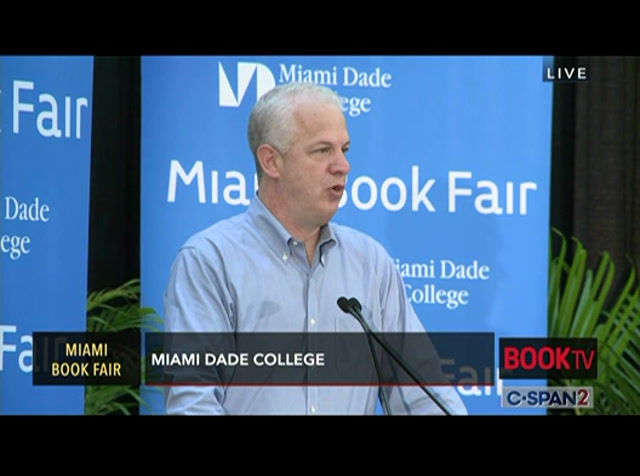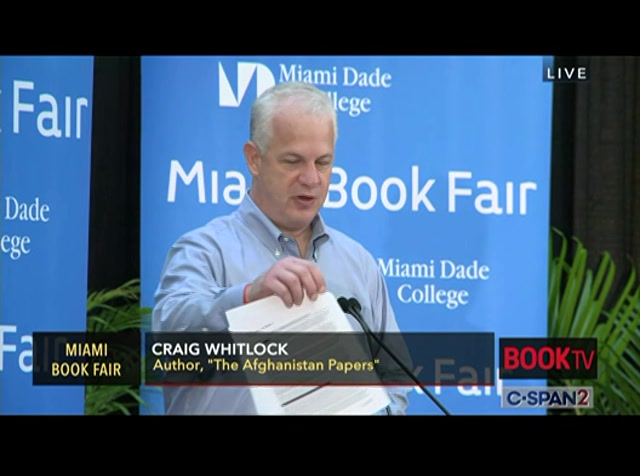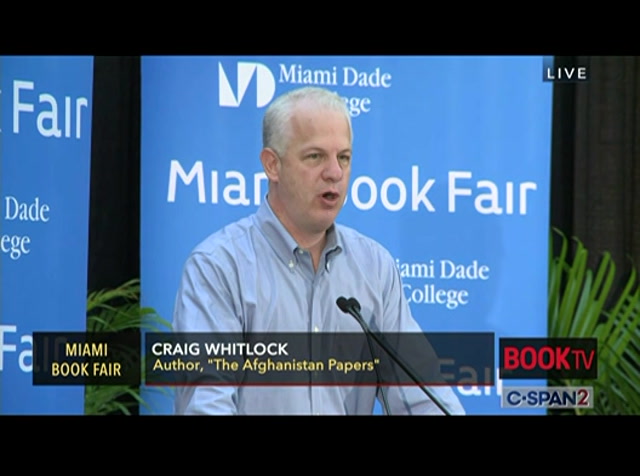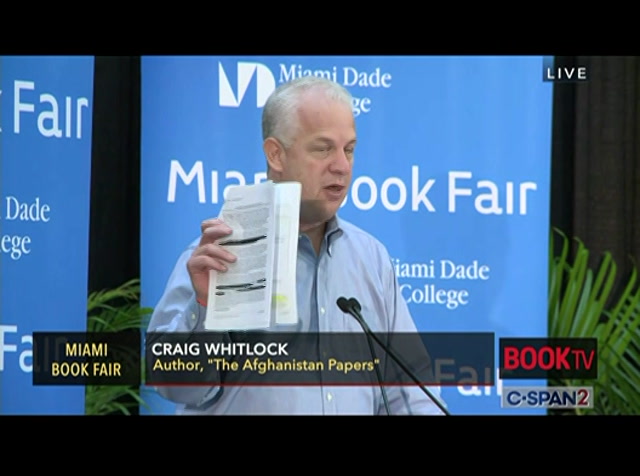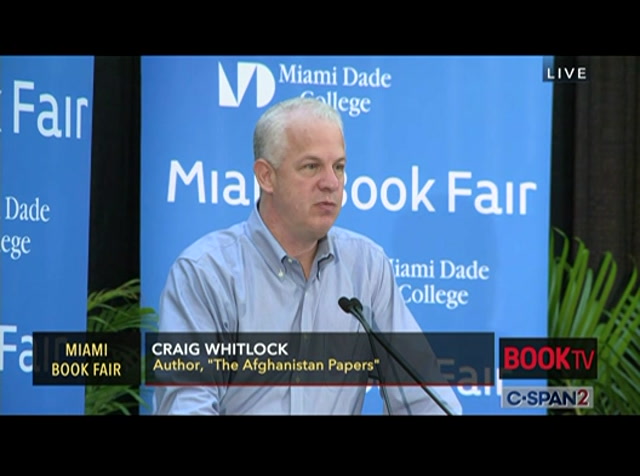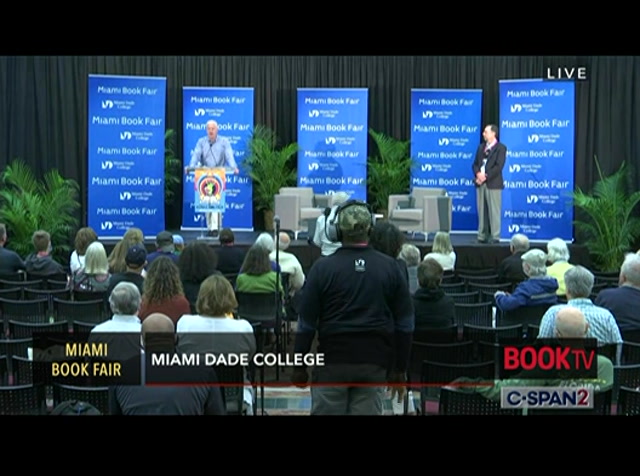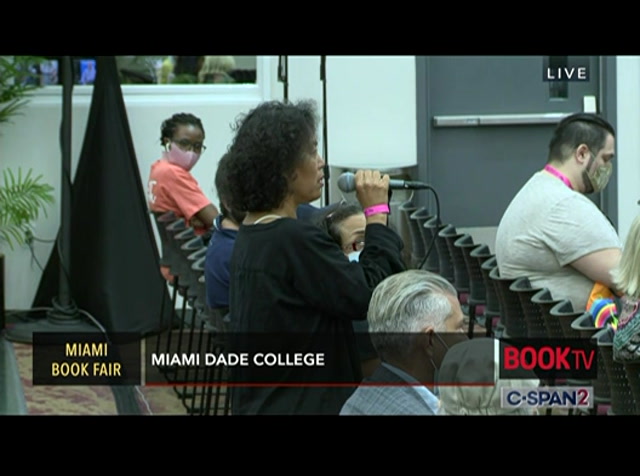tv 2021 Miami Book Fair CSPAN November 21, 2021 12:00pm-1:01pm EST
12:00 pm
booktv.org. >> download c-span's new mobile app and stay up-to-date with live video coverage of the historical events from lifestream of the house and senate floor and key congressional hearings to white house events and supreme court world arguments in our live interactive morning program "washington journal" where we hear your voices every day. c-span now has you covered. download the app for free today. >> welcome to book tv coverage of the miami book fair held on the campus of miami-dade college and for the first time in two years there are in person events. the schedule for today's coverages available at booktv.org or on your program
12:01 pm
guide. in just a moment craig gridlock will be on stage to discuss his in-depth look at u.s. relationship with afghanistan over the past 20 years. >> he will speak for 45 minutes and then questions. he may line up in the center aisle and use the microphone to ask questions. following his presentation he will be in the autograph signing area so you may meet him and bring your book at the elevators on this floor. i will export him there after the talk. welcome to the 38th miami book fair, this is my 12th year of doing this. it's been a pleasure. greg very grateful to the college and hundreds of volunteers that make it possible and our sponsors without whom we cannot do this. the foundation, the batchelor foundation, meredith foundation, green family foundation, stephanie and spencer stuart,
12:02 pm
t-mobile and many others. we would also like to thank our friends of the book fair. are there any friends in the room, give yourselves round of applause. thank you for coming out. [applause] >> if you would like to become a friend of the fair act has a lot of nice perks. as for that i'm going to put on my reading glasses and introduce craig whitlock author of the secret history of the work. craig is an investigative reporter with the washington post. this is a timely account of how the war in 2001 was straightforward, clear goals and unanimous public support and evolved into through ignorance, deceit and corruption. it's a lot untrained evolved into colossal failure. based on interviews of 1000 people who played a direct role in the war from the white house the pentagon leaders to soldiers and aid workers on the front line whitlock reveals how the
12:03 pm
u.s. government strategies were advanced, nation building was a failure in drugs and corruption had a triangle hold on our allies in the afghan government. tom bowman the pentagon correspondent called the book a searing indictment of the deceit, blundering a senior military civilian officials with the same tragic echoes of the vietnam complex. with that, i give you craig whitlock. [applause] >> hello everyone, thank you for coming out today. i am a reporter with the washington post. thank you for the introduction. i just want to talk a little bit of how the book came together. i definitely hope you ask lots of questions. i am a reporter so that's my job and like to ask questions. i'd be remiss if i didn't think i could answer as many as i
12:04 pm
possibly could about this book or the war in afghanistan in general. when i am done talking please don't hesitate to be shy, it is all free. this book, the afghanistan papers in a nutshell is about what went wrong in afghanistan over the last 20 years. also about how u.s. officials misled, deceived and lied to the public for much of that time. i don't use those words lightly. in the book i'm careful to characterize when government officials hard to spinning or misleading or hiding information or in some cases flat out lied. that is the goal of the book to explain in simple clear terms the people what went wrong in afghanistan and how the government withheld the truth about what's going on. there's aspects that are different. even though we were in war in afghanistan for 20 years and
12:05 pm
there has been all sorts of books written about the war, many excellent books. up until recently there were any that address what went wrong in afghanistan from the beginning to the end or the almost end. it was such a big subject to get your arms around. we had been there for 20 years. when you start to write a book that will explain what happened or what went wrong. most books were written about individual battles were episodes in time were certain presidential ministrations. until recently there had not been one that attempted to explain basic history of the war from beginning to end. this book came out on august 31 of this year which was coincidentally the last day that the united states troops were in afghanistan has president biden
12:06 pm
ordered their withdrawal. that was park when sitting on part not. when i was working on this book, we were originally going to publish it in time for the 20th anniversary of the start of the war in october. but this summer we saw things were unraveling in afghanistan and president biden had announced his intent to withdraw all u.s. troops. the publisher agreed to move the date to the end of august. fortunately we were able to get it out as the world was coming to a conclusion. one other unusual aspect of this book. it is based on this entirely on documents and public records. this book is based first on documents of the washington post that came from the u.s. government under the freedom of information act. talk about that in a second period it's also based on hundreds of oral history that was conducted with people who served in afghanistan whether
12:07 pm
army soldiers, generals, aid workers, you name it. i was able to drawling a number of great sources like collected oral history for years. the framework of the book is based on more than a thousand interviews. these are people that i personally interviewed, these were done by government officials, scholars or army historians and others. it is a framework based on documents. the other unusual aspect i never set out to write a book to begin with. this was based on a tip, that's how it started i'm an investigative reporter for the washington post so i do stories. i never written a book before and had no intention of writing one. in the summer of 2016 i got a call from a source. this source told me that there is something i should look up.
12:08 pm
there had been an interview that he u.s. agency had done with general michael flynn. he was an army general who served as the chief intelligence in the war in afghanistan and had been director of the defense intelligence agency. and if you've heard of michael since then. he was becoming more well-known because he was campaigning with president trump. at that point candidate trump during the presidential race. he gained notoriety when he appeared at the convention in 2016 and started chanting locker up about hillary clinton. prior to his entry in the politics general flynn was regarded, a good reputation within military circles, like i said he was an intelligence official inserted in afghanistan and iraq repeatedly. i had been covering the pentagon before i joined the
12:09 pm
investigative desk. i was very interested in what this interview with general flynn had been about. he was interviewed in length about the war in afghanistan. this interview was with a not very well known government agency called the special inspector general for afghanistan reconstruction. that is a mouthful but the inspector general's job was to attract fraud, waste and abuse in the war zone and start out if money were being misspent or people stealing it. i was curious why they interviewed general flynn but i thought i want to copy of what he said, i want to transcript in this interview. he was known for being a blunt forthright spoken person about how things are going in the war. i thought this is a relatively supple request. i called the special inspector general's office of afghanistan inside your people conducted an interview with general flynn.
12:10 pm
i hear it's an unclassified interview. he had been retired at that point. i would like to see what he said. can i have a copy? at first they said sure, that should not be a problem. why don't you put your request in writing under the freedom of information act which is our government public records law. so i did, they indicated i should expect to get a copy of the transcript of the interview in a couple weeks or so. it started to drag on in the presidential campaign began to heat up and general flynn started taking a more prominent role in the inspector general kept blowing me off on the request so finally when trump was elected president in name general flynn as his national security advisor. the very next day the inspector general sent me a formal notification denied my request to obtain a copy of what he said about the war in afghanistan.
12:11 pm
as you can imagine, there's more public-interest than what general flynn had said about the war. here is the guy who the three-star general in the war zone and now he was a national security advisor to president who is coming into office who promised to in the war but was unclear how that was going to happen. the washington post decided the public-interest was so great that we would file a lawsuit against inspector general to force them to release this interview. around the same time i found out the reason the inspector general had interviewed general flynn was for a program called lessons learned. they were trying to do a program that would study what i gone wrong in afghanistan and avoid the mistakes and any other military conflicts in the future.
12:12 pm
naturally there is public-interest and that, what mistakes did they make and what lessons did they learn or not learn. i discovered the inspector general had interviewed more than 400 people who played a role in the work. over the previous 15 or 16 years. this range from white house officials to diplomats and ambassadors to generals, to aid workers, asking officials and then the lightbulb really started going off of my head, i want to know what those people said to, why not. the american people deserve to know what the people who are in charge of the war said about the mistakes that were made and lessons learned. in any event when you sue the government intends to move pretty slowly. we had to go to court that took several months. but we finally, the special
12:13 pm
inspector general folded when we went to court after several months and they agree to release the transcript of general flynn to interview. this is it, ten singlespaced pages, it is a transcript of what he said. i got to lay eyes on it. he was excoriating in his interview, very critical of not just how the world was conducted but in particular how government officials portray the war. i covered the war ever since in the 2001 but there is a correspondent in the pentagon reporter for the washington post and that i was on the investigative desk. i was pretty familiar with the spent over the years from government officials where they would say we were making progress in afghanistan. no matter what setbacks happen, or if we had to keep sending more troops are staying longer, they were always making progress, turning the corner and they would acknowledge not everything was perfect but we had three presidents in arroyo,
12:14 pm
bush, obama and trump promised that we would prevail and when and afghanistan. and that they would be the president in the war. so this is what general flynn said about some of these things. he said operational commanders, state department policymakers and department of defense policymakers are going to be inherently rosy in their assessments. as intelligence makes its way higher, get consolidated and water down. it gets politicized, politics because once policymakers get their hands on it and wants operational commanders get their hands on it, they put their twist to it. my news before 9:00 o'clock in the morning was never good. what he means by that he was intel chief and afghanistan military headquarters in kabul. he will collect all of these intelligence assessments.
12:15 pm
he said my news before 9:00 o'clock in the morning was never good if i brought good news then, we captured or killed somebody or we just found out something or did something that actually works. for a while it might've made me feel good but after 2006 it was irrelevant because we were just killing so many people and it wasn't making any difference at all. this is what he said about the war in afghanistan this was his interview in the summer 2015. he goes on and on. he says operationally the reporting that comes out of their out of military headquarters is wonderful, it is rosy. i am on the video terminal conference with the secretary defense, the commander, the field commander and i get my presentation about what is going on and it sucks. it is almost like disregarding, commanders go got it, here's what were going to do anyway.
12:16 pm
he goes on and says this is a really important point. if you go back and look at the mission statement for every battalion and every brigade from the beginning of the work, they are essentially the same. it is defeat and destroy the enemy and protect the population. this is true for every commander for the u.s. side. it is essentially the two same things, defeat the enemy and protect the population. all these commanders were given that mission and executed the mission. and they also when they left they accomplish their mission every single time and you know what we can accomplish our mission. the next guy they drew their
12:17 pm
admission analysis and then they come back and say this is really bad that all these wonderful stocks, i'm telling you this is true from 2002 until today they also were doing a great job. why does it feel like releasing. this is a retired three-star general in the intelligence team that the government isn't telling the truth the military commanders aren't telling the truth, on the ground were losing but they all say that we are winning. i'm a reporter that i've already been on, that was even brighter because this is completely at odds of what the government had been saying. you have to remember the time of this is 2015. at that point, that was toward the end of the obama administration.
12:18 pm
people recall that president obama, when he campaign for office, particularly his second term, he promised to end the war and bring all u.s. troops home by this time the second term ended. that did not happen. at that time people assume the world was coming to an end. it was not a conclusive end but they thought it was coming to an end that the troops would come out and still the government had been portraying has asked access, that we could leave an afghan government would be strong to defend itself. here is general flynn who will be the new national security advisor saying no, it is nonsense, we've been losing and wind down since 2006 onward. then i want to know what that the under interview say with the other commanders and diplomats and other people. i thought after we won or lost that they would give up and give us the other documents we requested. the other interviews with 400
12:19 pm
other people played a role in the world. the inspector general dug in their heels and said no we will not give those to you, we had to go back to federal court a second time to obtain the other documents. even then inspector general drag their feet, it took three years before they would release the transcripts and the 400 other interviews. there was no real good reason. their argument was there was no public interest of what these people said in his interviews. the washington post is saying the public absolutely had not just an interest but had a right to know what their leaders were saying about the mistakes and afghanistan. finally it took a few years but we managed to get our hands on the other transcripts. let me read a few of them to you. pretend your reporter and you happen to get these documents he knew ty to get to read them and you want to know what they want to say.
12:20 pm
how bad were things afghanistan. one of the first ones we got was another three-star army general named douglas lutes. he served in the white house under bush and obama as awards are for afghanistan. by that he was not the military commander in the field but in charge of policy at the white house overseeing war, it's a pretty big job. here is general lutes talking about when he came into the white house in 2006 or 2007. i bumped into a fundamental lack of knowledge. we were the void of the fundamental understanding have afghanistan. we did not know what we were doing. what are we trying to do here, we didn't have the foggiest notion of what we were undertaking. we never would've tolerated rosy gold statements if we understood
12:21 pm
and this did not start happening until later in obama term. for example, the economy. we stated our goal was to establish a servicing market economy and afghanistan. i thought we should the specified drug trade, this is only part of the market that is worsening. it is really much worse than you think. let me explain what he means a market economy. part of the strategy was to build up afghan economy who the government could stand on its own feet. he is saying the market economy is not working at all, the only thing working as a drug trade. afghanistan supplies more than 80% of here winning opioids. he was being sarcastic but he said the only thing working since we've been the economically is a production of opium and heroin. listen to the season three-star general, the wars are under two presidents saying we did not know what we were doing. we did not have the foggiest notion of what we were
12:22 pm
undertaking. does anybody remember saying when the war was going on, i don't this is at odds with me. he also talks about how we were spending billions of dollars trying to build up afghanistan to build roads and schools and hospital clinics, all well-intentioned things but we were spending more money and afghanistan develop their economy then we did in western europe after world war ii under the marshall plan. that's adjusted for inflation, just to give you an idea of how much we spent in that country. the general says we were pouring money into huge infra structure projects to show that we could spend it. we were building infrastructure in ways that afghanistan could never sustain or use in some cases. he said one point in the example is a ribbon-cutting ceremony with giant scissors i attended for the district police chief
12:23 pm
and godforsaken province. the u.s. army corps of engineers completed building with a glass façade and atrium. the police chief could not even open the door, he had never seen a doorknob like this. to me this encapsulates the whole expense afghanistan. you can imagine that, he goes to ribbon-cutting ceremony with a fancy police station with a glass atrium and a ribbon-cutting in the afghan police chief cannot open the door, he doesn't know how to open the doorknob and were spending millions of dollars to put up that country. there is one other thing in interview i want to highlight particularly important. he said a few murky people knew the magnitude of this dysfunction, 2400 lives lost, who will say this is in vain. what is referring to 2400 lives lost to the troops that were
12:24 pm
killed or died in afghanistan, who will say this is in vain for an army general with the three-star army general to suggest, even suggest that u.s. troops may have lost their lives in vain and that word is pretty shocking. i served the military for a number of years and they always reassured the troops and their families that any sacrifice they made for the country is worth and appreciated and never in vain. here's a general on a confidential interview with another government agency questioning whether these troops may have lost their lives in vain. that is pretty shocking. let me read you some more trade imagine you're the reporter reading these things, these are not the assessments and the spin that you hear in public about the war. these are people in charge. i thought maybe flynn and general are exaggerating for effect. maybe they're frustrating how the work is going in there just
12:25 pm
venting. here's another interview, this is what it looks like printed out. along interview with ambassador richard bowser, the state department top policymaker for south asia p he's in charge of policy for afghanistan and the state department's chief spokesman for a while under president bush. this is how his interview starts off. general observations. let me approach this from two directions. the first question, did we know what we were doing? the second, what was wrong with how we did it. the first question did we know what we were doing, i think the answer is no. first we went in to get al-qaeda and to get al-qaeda out of afghanistan and without killing bin laden we did that. then the taliban was shooting back at us so we started shooting at them.
12:26 pm
they became the enemy. ultimately we kept expanding the mission. if there was ever a motion it is afghanistan. we went from saying we will get rid of al-qaeda so they can't threaten us anymore to saying we will in the taliban. then we said we will get all of the groups the taliban works with. then further to having an exit strategy, we needed a stable government and afghanistan. once you start saying that and you start getting into stable government, democratic elections, making sure the supreme court functions properly and the afghans have an anticorruption authority in a women's ministry that looks at women's rights, new educational curriculum, transitional justice, you are trying to build a systematic government while washington, d.c. which is not the best example but it's the one that we have in
12:27 pm
our hands. a country that does not operate that way. if we figure exit strategy is to be the taliban which can't be done given the local, regional and circumstances, or to establish an afghan government that is capable of delivering the government to its citizens using american tools and methods, then we have no exit strategy because both of those are impossible. let me unpack that a little bit this is the eighth state department top diplomat for south asia and a chief spokesman for a while. he is talking about expanding the mission. what he's saying, we went afghanistan and everybody knew why we went there to begin with, to go after al-qaeda to defend the united states against another attack like what happened on september 11. the missions shifted and expanded. i think people can grasp at that, once that happened things
12:28 pm
went off the rails. the reason we were fighting the taliban, they were shooting at us. they were not the enemy at first. he essentially said we have no exit strategy because these goals are impossible. he also started off his interview saying we didn't know what we were doing. you have a three-star general, top diplomat saying we didn't know what we were doing and afghanistan, that's pretty remarkable nobody had said this in public for 15 or 16 years and here they are in black and white, unclassified interviews and meeting the mission and the strategy is in a failure. i'm going to redo a few more so you get a sense of how consequential these admissions are. this is an interview with dan mcneil, he was a three-star army general, he twice served as a work commander in afghanistan under president bush he went one
12:29 pm
year, came back and went another year end led u.s. and nato troops. first he talks about in 2007 when he went there he said no nato campaign plan. a lot of talk but no plan. for better or for worse a lot of what we did we did with forethought most was reacting conditions on the ground there was no campaign plan. people who fought and existed taking care of their piece but it did not exist. here is a two-time general in charge that did not have a campaign or strategy they were over there fighting and reacting to the situation. he talked about the desired end. i try to get someone to defined to me what winning meant even when i went over nobody would give me a good definition of
12:30 pm
what it meant. after i was there couple weeks in 2007 the pressure became what's achievable. if we can reason 10 - 12 spots on instant mortality in poverty index that would be great. some people were thinking in terms of jefferson democracy but the stock would happen in afghanistan. again, two-time work commander saying we did not have a strategy . . . it was just stunning. i thought maybe he is exaggerating.
12:31 pm
then there is another interview with general mcneil's successor and afghanistan. a commander who was a british general. in charge of u.s. and nato troops for years during the bush administration. his interviewer started asking him about strategy. no long-term strategy, no command and control. tried to get a single coherent long-term approach, a proper strategy, but instead we got a lot of tactics. no coherent long-term strategy. he is saying the same thing as general mcneil. they did not get along very much. they did not see i to i. >> he is talking about just how hard it was to get attention or resources from policymakers in washington because at that point the bush administration was
12:32 pm
really focused in iraq. in 2006, donald rumsfeld asked me why things were deteriorating in the south of afghanistan. i said we do not have enough resources. general, what do you mean? i said we do not have enough troops and resources and we have raised expectations about the war. rumsfeld said, general, i do not agree. he has a confrontation, essentially, with the defense secretary. this is not working out. we need more troops, we need more resources. he bluntly tells him, no, forget it. i disagree, move on. pretty striking stuff. no one has said this in public. at that point, i knew we had a big story on our hands through
12:33 pm
the washington post. generals, diplomats admitting these failures in afghanistan. it is much worse than you think. i think most americans at that point, they understood the war was not going well. despite all of this rosy talk from their leaders. if it drags on for two decades, by definition, it is not going very well. they thought that it was important to tell the story as best as we could based on these documents. while i was doing it, i came across another patch of documents. these are called snowflakes. memos that the defense secretary wrote, so many memos when he was ahead of the pentagon that he would take them to a staff. he did not use e-mail. he would dictate one or two page memos. they would print them out and they would flutter down on
12:34 pm
people's desks. he actually dictated more than 50,000 of them during his time in office. there was a nonprofit group called the national security archive. it is a nonprofit private group. doing tremendous work. particularly during the cold war this is what they made their names for. they had been using the freedom of information act. they had sued the defense department to attain all of rumsfeld snowflakes. most of these are unclassified. the defense department was gradually releasing these snowflakes on a rolling basis to
12:35 pm
them. i had met with them and they agreed to let me have a sneak peak so to speak to deal with afghanistan. there were so many coming in about rumsfeld term it was kind of overwhelming. i was able to sort through them. these memos are really in line with these other interviews that we got. the one that really jumped out at me, this is what it looked like. one page memo. meetings with the president, october 21, 2002. also today at 2:55 p.m. i met with the president. introduced me to one of his classmates from yale. i had been alone with the president for three minutes and talk to him about the wednesday national security council meeting where i'd been told he wanted to meet with general make
12:36 pm
neal and general franks. bush said who was general mcneil rumsfeld says he is a general in charge of afghanistan. bush said, well, i don't need to meet with him. i said general franks and myers suggest we have a meeting. i just kind of want to stay in touch. here is the commander-in-chief one year into the war, does not know or has forgotten the name of his top general in afghanistan and when his defense secretary said i think you ought to meet with general make neal, he said, no, i don't need to do that. i don't have time for that. that is hard to believe.
12:37 pm
this is not with the public had been told about war. that shows you the degree to which president bush had stop thinking about afghanistan. that is where his focus was. already shifting to making plans to invade iraq. this tells us a lot about what went wrong in afghanistan. just one year into the war the white house, commander-in-chief had stopped paying attention to what was going on in afghanistan they thought that they had won the war there already. they stopped paying attention. all of their energy, attention and resources shifted to iraq. that memo, more than anything sums it up, i think. here is another memo from rumsfeld. two years into the war. september 8, 2003. just a few sentences. he dictated it under secretary
12:38 pm
of defense for intelligence. the top civilian intelligence official at the pentagon. i will read the whole memo from rumsfeld. who the bad guys are in afghanistan or iraq. i read all of the intel from the community and it sounds as though we know a great deal that in fact when you push out it, you find out we have not gotten any think that is actionable. we are human intelligence. let's discuss it. two years into the war, secretary defense, i have no disability and to who the bad guys are in afghanistan. think about it. two years in the war, defining the enemy. we knew the enemy will be started war with al qaeda and bin laden. within the first six months, al qaeda was gone from afghanistan. the leaders had been captured.
12:39 pm
that part of the mission had been accomplished. here we are two years later still fighting. we still have troops there. we cannot really define who the enemy is. even the defense secretary cap. who are the bad guys? i do not know. if you are going to war and you cannot define or identify the enemy, you know that you are in trouble. this subset out more than anything. after three years of reporting and getting our hands on these documents at the washington post, we were ready to finally publish. we decided we would publish a series about what went wrong in afghanistan and this is, i am just going to read you the headline and the first paragraph this is in december of 2019. a confidential trove of government documents obtained by the washington post reveals that senior u.s. officials failed to tell the truth about the war in
12:40 pm
afghanistan throughout the 18 year campaign. making pronouncements they knew to be false and hiding unmistakable evidence, the war had become unwinnable. in journalism, it is called a punch in the nose lead. the first paragraph of a story. we did not pull our punches on that. we said it flat out that they were not telling the truth and that they had made rosie pronouncements that they knew to be false. if you do not that easily. they knew what they were saying was false. the way we were able to do that was by documenting all of this. we published all of these documents online so that people could see for themselves that these people really said this. in this day and age of people saying you make up wind sources and anonymous sources, we thought it was important that
12:41 pm
these are public record. information that belongs to the american people. they should see all of it. we posted all of the material online. hundreds of these snowflakes from rumsfeld. we interwoven them with articles so that people could see for themselves. this is what they actually said. in some cases we had audio recordings. there is no doubt that this is true. we could back up that punch in the nose lead. people could see for themselves. we got a pretty big response. it actually published during president trump's trial. i thought that there was a real possibility that nobody would read the stories in the washington post because everybody was focused on impeachment or other things. people were really angry. they knew the war in afghanistan was not going well, but here was proof, here was hard evidence that their leaders had not been
12:42 pm
upfront with them about what had been going on. so people are angry. this led to this. there was such an outcry that there was a lot of demand from leaders to write a book. like i said, nobody had written a chronological narrative of what went wrong in afghanistan. in simple terms for people to understand spirit i had never written a book before and i did not have, well, for a book you need characters. you need narrative, you need dialogue. i just had a bunch of documents. fortunately, i was able to dig up some more documents. these oral history interviews. hundreds of interviews that the army had done with soldiers that had returned from afghanistan over 15 years. in these interviews, the troops
12:43 pm
are pretty blunt. they are pretty unguarded because they were being interviewed for historical purposes. they were not being interviewed by a journalist such as myself. they unburdened himself with everything they saw that had gone wrong in afghanistan. around the same time in late 2019, the university of virginia, the miller center for presidential scholarship had been doing an oral history project with the bush administration. they released 100 transcripts with officials from george w. bush's term. i was able to access those and pull out the ones that had to do with afghanistan. i was also able to get oral histories from the state department affiliated institute called the association for diplomatic studies and training. they had conducted interviews with diplomats that had served in afghanistan. you add all of that up, that is
12:44 pm
what this book is. a chronological narrative of what went wrong and the voices of people that served there. it is all based on documents, it is all unvarnished. it is people letting loose on what happened. it is completely at odds with what the public statements were under president bush, obama, trump and president biden. most of the work had been done before biden took office. the reason we call it the afghanistan papers is because i think most of you will understand the allusion to the pentagon papers during the vietnam war. the top-secret study, the defense department had conducted. they were leaked by daniel new york times and washington post. a lot of similarities and differences between the papers. at their core, they are the same secret studies, secret
12:45 pm
assessments of what was going wrong in both of those wars. they were completely at odds with the public statements of the government had made. they both ended up the same way. that is why we called it the afghanistan. i appreciate you all giving me a chance to explain the history of that, of this project to you. i am happy to take any questions if anyone has impaired please just step up to the mic and we will give it a whirl. >> you said that the goal of getting rid of al qaeda was already met. i was just wondering if you could make a reference to why the war continued. a lot of money to be made.
12:46 pm
i am sure that that had something to do with it. like what eisenhower said in a speech about the industrial complex. did you uncover anything? the oil fields in the amount of money made? >> that is a good question. there are references to defense contractors making a lot of money. a lot of corruption in afghanistan. no question that that exists. there was one estimate in one of these interviews with a guy who was a forensic accountant for the department of defense. his job during the obama administration was to go to afghanistan and analyze where all of the money was going. after a lot of work, he was able to estimate that up to 40% of all the money and defense contracts in the war zone, things like transporting food and fuel and weapons and
12:47 pm
everything else into afghanistan 40% of the contracts that were led out, ended up in the hands of the taliban, organized crime or corrupt officials. a lot of people were making a lot of illicit money off of the war, particularly during the obama administration. that is when we were spending the most. the beginning, i do not think that that is what was driving it. i think the bush administration took their eyes off the ball. within six months al qaeda had been eradicated from afghanistan bin laden went to pakistan. that point, they did not have many troops in afghanistan. only about 7000, 10,000 troops there. ironically, the bush administration was trying to keep those numbers really low because they were worried we would run into a repeat of what the soviets did in the 1980s
12:48 pm
when they got stuck in a quagmire. trying to keep our troop levels low and not spend money at a time when they could have done the most good in afghanistan. that is sort of a nuanced answer to your question. i think that we just took our eyes off of the ball. afghanistan was unstable. we were not quite sure what to do. things kind of drifted during those early years. >> thank you. >> did the secretary of state colin powell know what was going on or was he being sidelined? >> that is a good question. him and rumsfeld fought over a lot of things. you can read this in a number of books. powell gave a long interview to the miller center at the university of virginia where you really see this come out. they could not stand each other.
12:49 pm
most of their time they did spend arguing about iraq. they really spent time disagreeing about the training and equipping of the afghan security forces. the state department was actually responsible for trying to train and afghan police force. it was doing a terrible job of it. rumsfeld would really let powell have it bureaucratically in terms of criticism. there was a lot of sniping back and forth. eventually the defense department took over the training programs. it did not do much better. yes, there was a lot of pin fighting, but on that subject in particular, it was really important. under three presidents, the whole objective was to try to stabilize afghanistan so al
12:50 pm
qaeda could not come back. a goal was try to train and equip an afghan farm he so they could fight the taliban on their own without us there. there are number of chapters and passages about how bad that approaches. most americans were shocked at how quickly the afghan army sort of melted away and how the taliban took over so quickly. the roots of that go back to the fights between rumsfeld and powell. we explain those in detail in the book. >> thank you. >> god bless the investigative reporters. one of them is a lady who i had the privilege of meeting a couple of years ago. her name is kim barker. she wrote a book called the taliban shuffle.
12:51 pm
the strange days in afghanistan and pakistan. let me tell you, everything that you are saying is happening in washington and they are writing about, she was writing about the details that support that. then in 2016, there was a movie that came out that called whiskey tango foxtrot starring tina fey. i wonder if you could comment on this. >> i have not seen the movie, but those of you that do not know military lingo, it is alphabetical for w tf. w tf is a what the [bleep]. that is the point of that title. a lot of forehead slapping moments in afghanistan where things just did not add up. kim worked for the chicago tribune. i think that this goes to some think that i think is an
12:52 pm
important point. reporters all along have been chronicling what was going wrong or what was going well. that story was being told, but, certainly, the washington post, chicago tribune, new york times, wall street journal, they sent reporters to dangerous places to try to really show what was going wrong in afghanistan. the difference here, one thing if you are a reporter, you make a case and you show it as best as you can. it's very easy for the governor to come back and say that is not true. rumsfeld would do this all the time. talk about these negative news coverage did not show the reality of what was going on. the power of these documents as you hear it in their own words or admissions of how things were screwed up. they were worse than you thought. that is just something that we have not had since the pentagon
12:53 pm
papers in vietnam. >> the government can redact things as long as they come up with a legal justification. there is a lot that we still do not know about what they said that the government would not disclose. you have a good eye. >> just a week ago, i just came back from key west. a retired soldier just came back from afghanistan. he stayed there for eight years. he came back, he said he has lost. he does not want to come back. he got used two there. he belongs to their already. he says he feels -- when he was
12:54 pm
in afghanistan. he came back and he is nothing. he is trash. he is having all kinds of issues. he also mentioned in afghanistan , things are really bad. a lot of killings for women and civilians and children. he said the news will never reveal that. and then he blamed that. without any plan. biden withdrew from afghanistan. a lot of blaming about him. weapon and equipment for the enemy side and causing more chaos for the civilians there. what are your comments about biden's withdrawal?
12:55 pm
>> unfortunately, the story you tell about someone coming back, the challenges and difficulties and pain that they feel is all too real. i think one thing that i found out doing research for the book is more than 800,000 u.s. troops served in afghanistan. many of them, many troops went back four or five, six, even seven times. we kept asking so much of these people to go back and serve their country and make the sacrifices. they are the ones having to bear the burdens of that in of ways. and, those people in particular, i think when they read this book and i hear from them, there is
12:56 pm
that anger and frustration because the war in afghanistan was different from some of our other conflict. afghanistan, the war in afghanistan was seen as a war of self-defense. after the 9/11 hijackings, everybody understood why we were going to war in afghanistan. it was an attack to go after al qaeda. a lot of protests in the street. people supported our troops going over there. our troops really, you know, many of their volunteered. they enlisted. they thought that it was their duty to serve and protect their country. these people that served their, they read their leaders, their commanders admitting they did not have a plan, they did not know what they were doing. all of these failures and mistakes, i think a lot of them felt betrayed.
12:57 pm
they know a lot of their buddies were killed. they are saying, for what? they are angry. a lot of them are glad that the real story is coming out. they had, from their viewpoint, from their corner of where they were serving, many of them saw that things were not going well. doing their best to follow a strategy that may be did not make a whole lot of sense. hearing the stories of people coming back and having that difficulty adjusting. we asked them to fight a war to defend our country. in the end as we all saw in august, there is not a whole lot to show for it, unfortunately, with the taliban back in control. i want to thank everyone for the great questions and for your attention. it is a pleasure to be here. happy to sign books afterwards. [applause] >> i know that there are a
12:58 pm
couple more questions out there. the author will be joining us. going to go get a coffee. we will see you on this floor. thank you book tvs coverage of the miami book fair continues now with the virtual program longtime new york times supreme court correspondent linda greenhouse shares her views on how the high court has changed over the past two years. >> hello. welcome to our viewers and mainly thank you to an old friend of mine. i am just so excited for her new book that is out. we will have a conversation now
12:59 pm
for 45-60 minutes. i wanted to start by saying i have known linda since the late '80s when i started covering the supreme court, too. for a long time, we were competitors. i was working full-time at the washington post that she was full-time at the new york times. we started on our respected book journeys. a lot of people from the outside still new the competitors. i will never forget one day when we decided to have lunch together. we were walking out in a group of older visitors, they said, look, there is linda greenhouse. and they are together. i always think, you know, yes, here we are, one more time together. it is a real privilege to start
1:00 pm
asking you about your book, which lots of people will see. talking to you about this. before we start, i just wanted to ask you if you wanted to say a few words about what you are trying to do here before we get down to the nitty-gritty. >> thank you. we go back a long way. >> it is not as competitive as people may think. you always had great sources. we all got the same information at the same time. these opinions come down and everybody gets them. you just do the best that you can. you just kind of situate the project that became this
85 Views
IN COLLECTIONS
CSPAN2 Television Archive
Television Archive  Television Archive News Search Service
Television Archive News Search Service 
Uploaded by TV Archive on

 Live Music Archive
Live Music Archive Librivox Free Audio
Librivox Free Audio Metropolitan Museum
Metropolitan Museum Cleveland Museum of Art
Cleveland Museum of Art Internet Arcade
Internet Arcade Console Living Room
Console Living Room Books to Borrow
Books to Borrow Open Library
Open Library TV News
TV News Understanding 9/11
Understanding 9/11
